
|
The Non Smokers' Movement of Australia | |||
|
Protecting the rights of the Non-smoking majority from
tobacco smoke and from the tobacco industry's propaganda. |
||||
| | Home Page | About | Publications | Newsletters | Fact Sheets | Campaigns | Search | | ||||
Issue 51, April 2005
|
DRIVE TO BUTT SMOKE OUT OF CARS Pressure is mounting to ban drivers from smoking in vehicles as well as to protect children from the well-known hazards of secondhand (environmental) tobacco smoke in vehicles. Here and overseas, various reasons are given for such a ban; for child protection, for improved road safety, to reduce the number of bushfires, to protect the environment, and to reduce smoking prevalence. 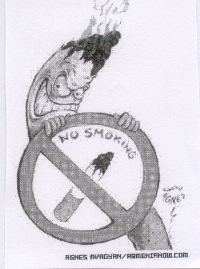
Mobile phone users are prosecuted for driving while using their phones but we have yet to hear of smokers being charged for the far more dangerous practice of smoking while driving. Smoking is already banned in all public transport and in commercial vehicles as well as in instances where private vehicles are being used for business purposes. Non-Smokers' Movement of Australia aims to have smoking banned from cars and other vehicles for several very important health reasons. Obviously, we are calling for passengers as well as drivers to be banned from smoking in vehicles in order to eliminate secondhand tobacco smoke in such confined spaces. 1. If children or disabled people are in the vehicle they will then no longer be subjected, in confined spaces, to secondhand tobacco smoke. Unfortunately, the Cancer Council message "Car and Home, Smoke-free Zone" still hasn't reached some diehard smokers who continue to subject their young passengers to physical child-abuse, similar to dropping poison in their milk-bottles. 2. Other road users will be safer, as drivers who smoke won't have the distractions of the smoking process. We have asked the NSW Government:" Would a driver be considered to be in full control of a vehicle whilst carrying out the following actions:- A. Removing a cigarette from a packet, or rolling a cigarette, or filling a pipe? B. Lighting a cigarette, either with an inbuilt lighter, a match or a regular lighter? C. Holding the cigarette, smoking it and disposing of the ash? D. Extinguishing and disposing of the cigarette, cigar or putting the pipe away?" In addition, we have asked if the driver would be in full control of the vehicle if he or she were carrying out any normal smoking actions during an emergency. Similarly, how would a new, inexperienced driver cope? Smoking is a complex operation, and the potential for disaster in the case of a smoking driver is enormous. If you drop your mobile phone in your lap, it's a nuisance - think of what can happen if you drop a lit cigarette into your lap!! 3. There will be far less possibility of bushfires - we are advised that butts tossed from vehicles start approximately 4500 bushfires per year. 4. Cleaner environment, with far less butts on the roads being washed down stormwater drains and poisoning our land, oceans and rivers. Last but not least, drivers and passengers will smoke less and will find it easier to quit, with one less venue for smoking available to them. Did you hear the story from overseas about the smoking driver of an expensive car He tossed a cigarette out of a window, but the cigarette blew back, setting the back seat on fire and filling the vehicle with smoke. The driver pulled over and jumped from the flaming vehicle which continued to roll until it crashed into a guardrail, then burned to the ground. Was this the case of a littering firebug or a flaming litterbug? Editorial. We continue to hear the same old questions from the public about tobacco. Smokers say, in response to further smoking bans "What about smokers' rights to use a legal product?' and we say, "Sure, you may have rights, but not to smoke where the poisons in tobacco smoke may affect others your rights stop at your own body, at your lips". Why doesn't the Government simply outlaw tobacco? Is it because they're addicted to tobacco taxes? You work it out Approximately. $5billion is gathered in excise from tobacco each year. Yet the Federal Liberal Party still won't set a target for reduced smoking rates for the year 2010, or any year. Nor have any substantial funds been allocated to continue reducing smoking rates. Tobacco control has been painfully slow, with piecemeal legislation shot with the odd loophole. Add to this the cosy relationship between the tobacco industry and the Liberal Party, and it's no wonder that neither the Prime Minister nor the Minister for Health speaks out strongly against this deadliest of drugs. The recently published Australian Tobacco Control Strategy 2005-2009 which is endorsed by all governments but which sets no firm targets, and has not yet been funded, nevertheless has some interesting references. I strongly object, however, to the opening Executive Summary mentioning smoking rates for 18-25 year olds, and for over 25's but not mentioning the disgraceful rates amongst under 18's, the most vulnerable and most gullible smokers, and those to whom the quit messages must be strongly directed. Research indicates the younger a smoker is when he or she starts, the more likely he or she is to continue smoking through life. Our steps towards a society free of tobacco smoke are sometimes painfully small and slow, but we must keep up the momentum, for the sake of a healthier society now, to consolidate all the good work that's been done in the past, and especially for the future. Keep reminding people of their basic rights to clean air, free of the poisons in tobacco smoke. They wouldn't accept poisons in the water why allow anyone to poison the fresh air to which every body is entitled. I recently called for smokers to be asked not to smoke in a section of a club, asking if the manager would allow barworkers to put poisons in patrons' drinks. She said my comparison was "just silly" and she was far too busy to talk about such things especially since her club "complied" with current regulations. I urge you to speak up, not only to point out injustices and breaches of the law, but also when you see positive aspects of tobacco control and of voluntary smoking restrictions which protect our rights to clean air. I visited two distinctly different places recently, both of which have placed restrictions on smoking. Broken Hill Hospital Site has been declared completely smoke-free with clear signage asking smokers to put out cigarettes before entering the grounds. Strong leadership and effective consultation led this community, despite some strong objection, to take practical and achievable steps to reduce smoking uptake and to help smokers to quit, as well as to protect the hospital users' rights to clean air, free of tobacco smoke. 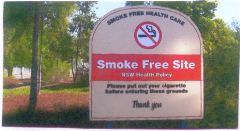
Broken Hill Hospital The Mariner Hotel, at Port Lincoln, in South Australia, is smoke-free in all indoor areas, even at the poker machines. 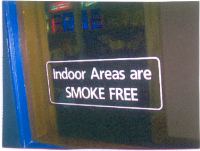
Mariner Hotel, Port Lincoln 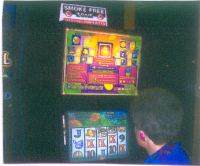
Poker Machines, Mariner Hotel World No Tobacco Day 31st May This is a good day to take some further action, to stop procrastinating we all do and write several letters to local, state and federal MPs, demanding further (specific) action to protect our rights to clean, tobacco-free air. World's Biggest Ashtray Photo Competition You've seen pictures of our wonderful NSMA umbrellas in recent Update newsletters. You can win one with a photo of the World's Biggest Ashtray. Send entries by 30th June by mail or email. Margaret Hogge, Hon. President Advocacy of Indigenous Consumers' Interests NSMA has made a submission to Northern Territory Dept. of Justice, indicating "We are especially concerned for children and for disabled people who have, to a disturbing extent, been left behind in the recent improvements in legislation restricting tobacco use" "most vulnerable are the least protected." Queensland's Government has, after a moratorium of three months, started to enforce legislation to protect its citizens' and visitors' rights to clean air, including in outdoor dining areas. Saturation publicity has dwelt often on negative grumblings from smokers, but the Government seems to be holding to its resolve to reduce exposure to tobacco smoke. Making it Better - Effective Public health Advocacy Conference Hosted by Cancer Council NSW, to be held 29th/30th August 2005 at Riverside Theatre, Parramatta. Enquiries: Kylie at the Cancer Council or Phone 02 9334 1859. Successes in Public Health - 36th Public Health Assoc. of Australia Annual Conference 25-28 Sept.2005 Perth, WA. Enquiries to: The PHAA Conference Organisers Pubs and Clubs are Encouraging a Culture of Smoking, by delaying smoking bans and by claiming that areas which are almost fully enclosed areas should be designated as outdoors in order to "accommodate smokers". We say the smoke must be allowed to escape, and that cannot happen where there is a roof. Pubs and clubs continue to spend millions on alterations and extensions to their premises "to accommodate smokers" who make up only a small part of the population. We joined our Smokefree Australia Coalition partners in demanding that any decisions about outdoor areas be based on whether smoke can escape from an area, and that even outdoor areas must have restrictions on smoking, as there is no safe level of secondhand (environmental) tobacco smoke, Decisions must be made for health rather than commercial reasons. There's no doubt that the hospitality industry is hell-bent on keeping patrons smoking as they push for more and more of their indoor spaces to be designated as outdoors, and therefore to allow smoking. When do they ever welcome non-smokers? When do they ever take the initiative and question their industry leaders about the unsafe and discriminatory work practices which they indulge in on a daily basis? Do you realise that a further cohort of 18 year olds can legally enter pubs and clubs in Australia each successive day? These young people can lead smokefree lives indoors in most other public places around Australia, but at 18 they will almost certainly be confronted by the smokehaze in pubs and clubs as they go out with friends who smoke and who selfishly insist that they go where smoking is allowed. Many will either take up smoking or will smoke more than previously simply because smoking is allowed and encouraged in these venues. NSW and Victoria must wait, according to their Premiers, a further 791 days until total bans (except casinos). We wrote to every NSW Member of Parliament, at the re-opening of Parliament this year, welcoming them back to their smoke-free workplaces and reminding them of their responsibilities towards workers and patrons in pubs and clubs, as well as reminding them that we do not accept July 2007 deadlines, The only acceptable date is NOW. We also wrote to the proprietors of all Irish pubs around Australia prior to St. Patrick's Day, requesting that they at least go smokefree for Irish National Day, and to have a true Irish atmosphere after all, Irish pubs have successfully and peacefully gone smoke-free since 29 March 2004 a terrific achievement for the tobacco control groups and the Irish Government, who can claim to have saved about 5000 lives a year. As expected, there was no response from the Irish pubs, nor "compliance" with the request. We have written to four Sydney RSL (Returned Service League) Clubs after personal visits on ANZAC Day. Again, we say they should at least go smoke-free on Anzac Day, their busiest day of the year, but Non-Smokers' Movement is treated more like the enemy than any robbers, hooligans or terrorists. Community service clubs which should set an example and which claim to assist many non-profit groups in local areas would help in the best possible way by setting an example and banning smoking firstly to protect their own workers and members but also to help the vast majority of smokers who want to quit. Twisted logic pops up when a community club uses funds to buy a defibrillator for the town when it could best help the community by banning smoking and encouraging smokers to quit. We are hoping to get together with other Tobacco Control "movers and shakers" in Tasmania early in January 2006 (if not before) to celebrate the first totally smoke-free indoor public places in Australia. Hopefully we won't need to protest at the Casino let's all work on making it a total triumph. Smoking Neighbours The largest landlord in Australia, Department of Housing in NSW has just announced its "smokefree" policy after 18 months of consultation. This Department manages 68,000 units. Following complaints about smoke and smokedrift in common areas, the policy includes no smoking in all common areas, signage requirements, mediation and guidance for repeat offenders. Unfortunately, no amount of signage will stop smokedrift from invading other people's homes. This Department should protect its tenants and their rights to clean air by providing completely smokefree blocks, especially for families with young children. As Brian McBride says, "It's one small step, but a long way to go." "How do I stop my neighbour's smoke from invading my home?" A recent conversation with a home unit resident whose neighbours' smoke wafts around unchecked. This is the same sort of smoke as in pubs and clubs it doesn't know how to stop at the thick white line painted a metre or so from the bar. The lady said she understood that smokers have rights to smoke in their own homes so she guesses there's nothing she can do about the smoke drift. Why not? Why should a neighbour be allowed to spread poisons in anyone else's airspace? If the neighbour had played loud music after midnight he could be penalised for noise pollution. If he had somehow added even a harmless chemical to the water supply, he could probably be charged with a criminal offence. We have every right to clean air, free of tobacco smoke, in public places and even more importantly, in our own homes. Non-Smokers' Movement continues to investigate the issue of a Strata Corporation introducing its own non-smoking by-law. Designated Outdoor Smoking Areas Following discussions with the General Manager after last year's Sydney Royal Easter Show, I found that no-smoking signage has slightly improved at outdoor arenas. Better still, security staff seemed more aware of the restrictions, and reported that most showgoers respected the fact that seating is usually very crowded and that tobacco smoke can drift around indiscriminately, spoiling the events for many. Many smokers would by now be accustomed to restrictions in outdoor seating arenas due to the post-Olympic smokefree regulations. Smokers wandering around the grounds were another, and different, force to be reckoned with. We will continue to call for Designated Outdoor Smoking Areas to be made available at this and similar events. Criteria:
Retailing Tobacco "Cigarettes in Australia remain more visible and more widely available than any other consumer product, including milk and bread." (P21 Nat. Tobacco Strategy) 
Coles, Tasmania to avoid having graphic, unpalatable images on display at tobacco sales desks, Coles Supermarkets have opted to put tobacco products "out of sight" We found a Coles in NSW with tobacco out-of-sight, not for any altruistic reason, but because there had been several tobacco thefts there recently. NSW Health Dept. Legal Office will not advise us on the legal definition of a "point of sale", following our question to the Department in regard to retailers' signage to be displayed. Following the discovery of a website which advertises (without health warnings) cigarettes at less than half price and with no physical ID check for proof of age, we call on all Governments to immediately close down the website and to close loopholes in the legislation. We also demand an effective licensing system for retailers, one which can be used to educate and test retailers on the dangers of tobacco and on harm reduction, for data collection, as well as being used for a penalty scheme. "the world Bank has concluded that raising tobacco taxes is the single most important step that governments can take to reduce smoking among both adults and young people, particularly in lower socio-economic groups. On average, a 10% increase in the price of cigarettes results in a 4% reduction in smoking by adults and a 16% reduction in children, reducing overall tobacco use but increasing tobacco tax revenue.(Nat. Tobacco Strategy p21) Tobacco Industry Somebody tell us that fruit-flavoured cigarettes which glow in the dark are not aimed at children, and especially young women, very much as sweet mixer drinks have saturated the market to hook youngsters with relatively immature tastes. We call on Health authorities to investigate these evil and deadly products immediately and to cut off supply. Unfortunately, by describing these products, we give them some credibility but parents know to look out for them. British American Tobacco yearly profit reported at $2.68billion to 31Dec2004. Sales increased in all regions except America/Pacific. Australian Competition and Consumer Commission (ACCC) should pursue Tobacco Companies in court for allegedly deliberately misleading consumers into believing that "light" and "mild" cigarettes were less harmful. The current discussions about a media campaign to advise smokers of the true nature of these products is not enough penalty and could even cause smokers to continue smoking rather than try to quit. Then I discovered the miracle of Apathy. International News Philip Morris Tobacco has taken over a company in Indonesia which produces 90% of the country's clove or "kretek" cigarettes. Indonesia has not signed the Framework Convention on tobacco control. Also, it is a major exporter to China, which has so far resisted Western tobacco investments. The Scottish Parliament has approved smoking bans, starting in April 2006, which will mean "Lifting the smoke blanket from our pubs and clubs, cafes and restaurants and enclosed public spaces. It will save hundreds of lives every year" Health Minister Andy Kerr. Brian McBride receives President's Award Introduction of the 2005 Thoracic Society of Australia and New Zealand President's Award winner, Brian McBride, Mr Chairman, Ladies and Gentlemen, It is my understanding that awards such as the President's Award should be for people who have provided outstanding service in the chosen area of the award. This Year's recipient has done just that and the award is for contributions to smoking control. I believe that, no matter the size of the contribution, the spirit of this award is not for someone whose job it is to work in smoking control, a job for which he or she is paid, but for someone who has been prepared to go the extra distance beyond his or her duty, to further the aim of reducing smoking in the community and thereby improving health in the community. It is for someone who is prepared to put in extra effort and run the risk of unpopularity or worse in the interests and welfare of others. 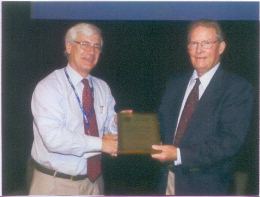
Brian McBride receives his award I don't think that the award should be for politicians who just pass legislation as a response to public demand but who have no real commitment to the health of the public rather a desire to stay in office. I believe that our society should acknowledge and encourage people like Brian because it is through them that change can be made to happen. I have personally witnessed how effective voluntary community activism or service can be in achieving change in the areas of smoking control as well as asbestos regulation. I know from my own experience how difficult it is to achieve change from within the health system (however much one believes in the system) because of the inertia of the bureaucracy and the nature of our wonderful democracy. Western Australia was the first state in the English-speaking world to introduce legislation for tobacco control into parliament but not the first to pass it. It happened because a group of like-minded people got together, initially in a somewhat clandestine way, prepared a parliamentary bill and then found an independently-thinking committed parliamentary backbencher to introduce it into our state parliament (just up the hill from here). Of course it failed but it excited community debate about smoking like nothing had before and ultimately the government of the day decided that the community was ready for change if not demanding it. And so it obliged with a bill to reduce tobacco advertising in the state. But only to the extent that the majority could cope with it. The same has occurred throughout Australia, bit by bit, state by state. As it has done in the rest of the western world, incrementally and depending on how much it is possible to contain the influence of the tobacco and entertainment industries, who are committed to holding it back. In other places like California, progress has been faster than in Australia. But smoking prevalence rates have fallen, albeit currently stalled, and smoking-related disease rates have also fallen in Australia. So the effort has been rewarded. Brian McBride was one of the Australians who determined that he needed to put in the extra effort over 30 years ago. He never earned a living from the anti-tobacco business which did not really exist at the time. He was an electrical engineer who graduated from UNSW in 1964 having gained a diploma in electrical engineering from Sydney Technical College in 1959, retiring from deputy directorship of the Sydney office of the Commonwealth Dept of Industry, Science and Technology in 1996. He hated being subjected to the passive smoke generated by his 4 brothers and 2 sisters and started a 1-man campaign to get smoking banned on his local bus service in 1976. The unreasonable objections and personal attacks on him by smoking bus drivers escalated to the point that he sued one driver for assaulting him with cigarette smoke and won the case. It made front page news in the Sydney Morning Telegraph and eventually National TV! As a result of the publicity he was approached by a number of people to keep the fight for non-smokers' rights going in other areas like restaurants. He then organised a public meeting in Parramatta in October 1977 where the Non-Smokers Movement of Australia was formed. Brian became Honorary President for the first 10 years. He then stepped down to become vice-president and was replaced by Dr Arthur Chesterfield-Evans. After Arthur entered the NSW Parliament in 1997 Brian resumed the role of president until 2003 when he retired. Campaigns were conducted by encouraging workers to rebel against past acceptance of smoking as a "workers' right" 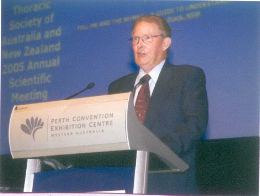
Brian McBride responds These workers were then supported by other members of NSMA who conducted street protests, blockaded ministers' offices, collected petitions and marched in front of NSW Parliament House etc. Talk-back radio was used and press releases were issued to gain media coverage. Next came the fostering of legal cases designed to underpin the proposition that non-smokers did have enforceable rights. These cases demanded changes to the law to establish and uphold these rights. NSMA supported Ken Bishop and Roy Bishop, two unrelated Canberra public servants in their claims for a smoke-free workplace in around 1982-5. These were the cases that made the Australian Public Service (under Peter Wilenski) and the Australian Public Service Union take smoking at work seriously which led to the ban in 1986. NSMA took Channel 10 to court for breaching the Broadcasting and Television Act over Winfield Rugby League Advertising in 1984 and won. After several years of attempting to get other agencies to join forces in support of this action Brian finally went it alone by personally signing the summons and bringing the matter to court. He had to present the videotapes of the broadcasts and give first person evidence of having seen the broadcast as well as having to prove the authenticity of the tapes by being sworn in as an expert. He did this by utilising his credentials as an electrical engineer with an honours degree. The case survived appeals to the High Court and made a huge contribution to the eventual demise of tobacco sponsorship of sport in Australia. NSMA went where others feared to tread. It supported Liesel Scholem in her passive-smoking case against the NSW Health Department in 1989-92. These landmark cases forced the introduction of smoke-free workplaces throughout both state and federal jurisdictions. Brian personally campaigned for smoking bans courtside at his tennis club (Parramatta) and was publicly criticised by people who should have been supportive. He and others at NSMA met the costs of their efforts personally. Word has it that he may have even been a BUGAUP man but that secretive organisation never disclosed its members. I have not personally met him before today but he was described to me as a retired engineer who looks like he goes to church on Sundays! Not an image of the radical activist! Today you can make your own judgement on that. Brian and NSMA are testament to the power that voluntary organisations can wield and he must be recognised for the impact of his efforts on smoking control in this country. It is appropriate that our Society recognise him. By Bill Musk |

|
The Non-Smokers' Movement of Australia Inc, Box K860, Haymarket NSW 1240. | |||
| This page was last updated on 2nd June, 2005, previously 18th May, 2005. | ||||
| Home Page | Publications | Updates List | Top of Page | ||||